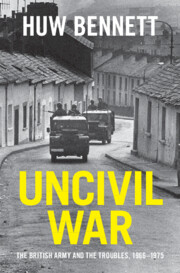Book contents
- Uncivil War
- Cambridge Military Histories
- Uncivil War
- Copyright page
- Dedication
- Contents
- Figures
- Maps
- Tables
- Illustrations
- Abbreviations
- Introduction
- 1 Baggage
- 2 The Army’s Short-Lived Ulster Honeymoon
- 3 Escalation and the Erosion of Impartiality
- 4 Edward Heath’s Bid for Victory
- 5 The Road to Bloody Sunday
- 6 The Most Deadly Year
- 7 Strategy in the Shadow of Loyalist Power
- 8 We Cannot Envisage Peace
- Conclusion
- A Note on Sources
- Acknowledgements
- Notes
- Bibliography
- Index
4 - Edward Heath’s Bid for Victory
Published online by Cambridge University Press: 03 August 2023
- Uncivil War
- Cambridge Military Histories
- Uncivil War
- Copyright page
- Dedication
- Contents
- Figures
- Maps
- Tables
- Illustrations
- Abbreviations
- Introduction
- 1 Baggage
- 2 The Army’s Short-Lived Ulster Honeymoon
- 3 Escalation and the Erosion of Impartiality
- 4 Edward Heath’s Bid for Victory
- 5 The Road to Bloody Sunday
- 6 The Most Deadly Year
- 7 Strategy in the Shadow of Loyalist Power
- 8 We Cannot Envisage Peace
- Conclusion
- A Note on Sources
- Acknowledgements
- Notes
- Bibliography
- Index
Summary
Introducing internment in August 1971 broke ancient prohibitions against detention without trial and forcible confessions, and incited a fervent reaction across Northern Ireland. Rather than viewing internment in isolation, this chapter evaluates the implications of Prime Minister Heath granting the army permission to wage war against the IRA. The wartime mindset began to take hold because initial operations appeared to be successful. Even as the Provisionals escalated their violence, soldiers retained some sympathy for the Catholic population, and thought of their own approach as discriminate. An arms amnesty, searches and arrests provided plentiful statistical evidence to feed the optimistic mood. Improvements to the military intelligence system gave credence to General Tuzo’s wish for gradual, low-key attrition of the IRA, especially targeting the Provisional leadership. This chapter argues the turn towards repression built slowly, and derived as much from the nature of British common law, Britain’s global commitments and London’s calculations about blame politics, as it did from fears of a loyalist backlash. The growing hurt done to those adjacent to the targets of the military failed to register as meaningful enough to force any major re-think in strategy.
- Type
- Chapter
- Information
- Uncivil WarThe British Army and the Troubles, 1966–1975, pp. 93 - 121Publisher: Cambridge University PressPrint publication year: 2023

